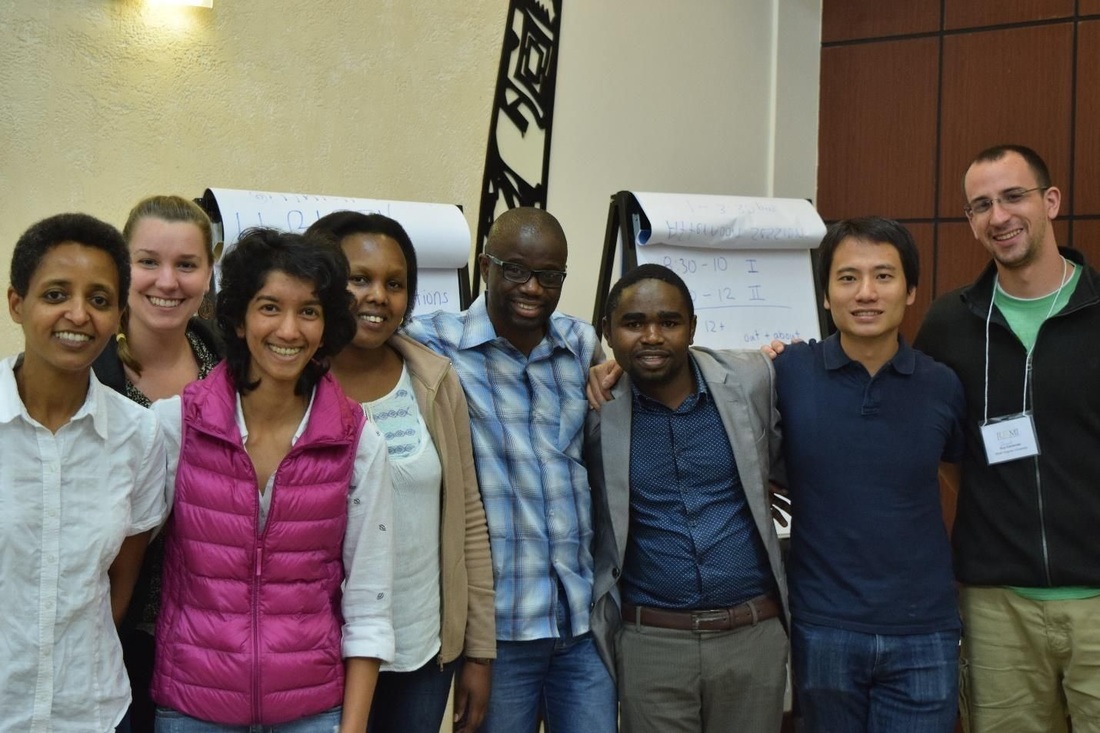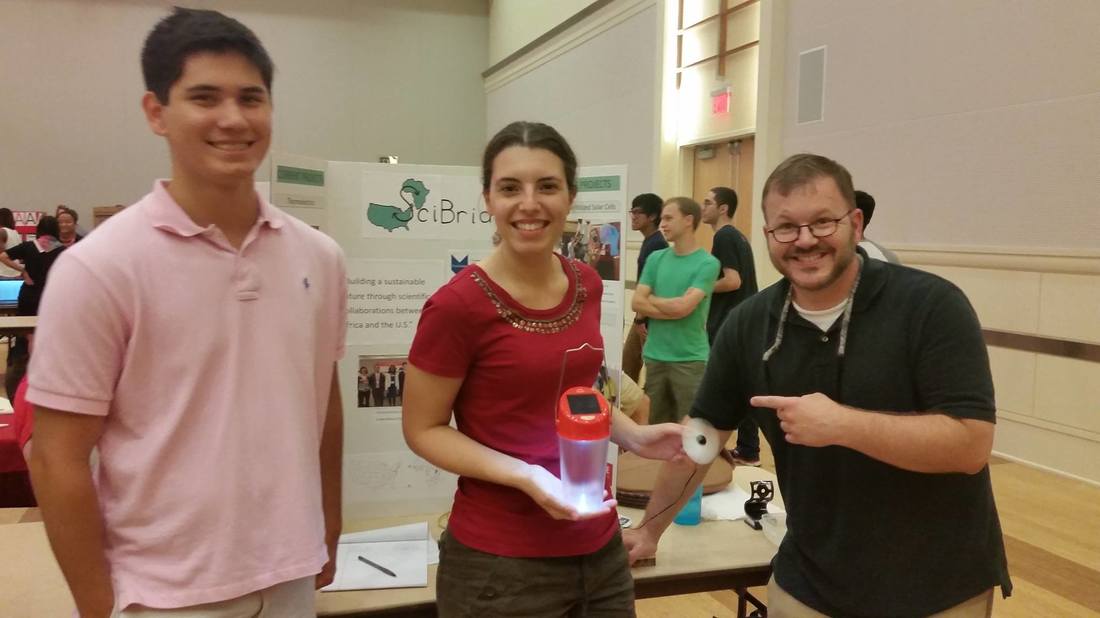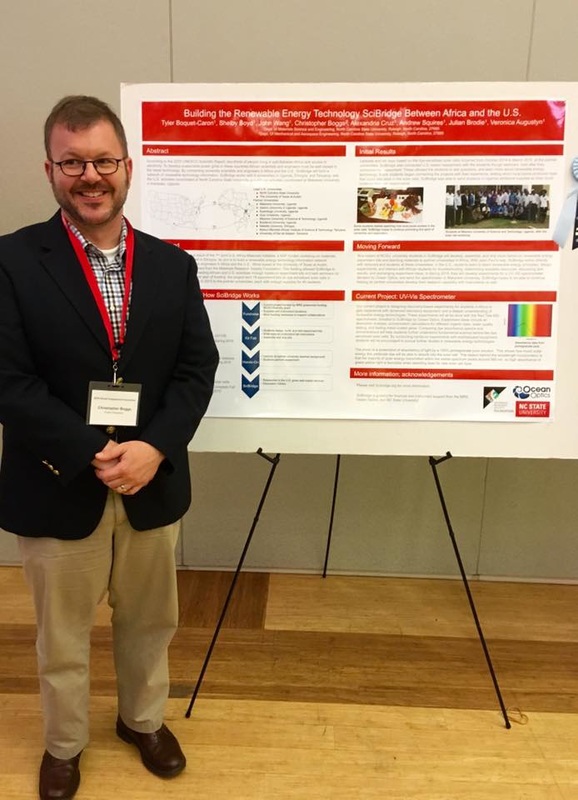|
The following is a copy of a press release Development of economically viable labs for African universities [September 12, 2016] [Raleigh, North Carolina, U.S.] – A team of materials science graduate students from across the United States and East Africa is moving forward with their plan to develop low cost electrochemistry labs for undergraduates in African universities. The team intends to create a module comprising a potentiostat, a lab manual, and supplies for a semester’s worth of experiments—all for less than $100 per student. This will be achieved using an Arduino based potentiostat. The planned experiments will teach the students how energy technologies function, from batteries to solar cells, while reinforcing fundamental concepts of electrochemistry learned in lectures. The team met this summer while participating in a sustainable energy workshop in Arusha, Tanzania, hosted by the Joint Undertaking for an African Materials Institute (JUAMI). There, the students learned about various setbacks faced by African scientists throughout their education. “One issue repeatedly brought to our attention was that African scientists generally lacked the handson experience that we gain in our undergraduate labs here in the U.S.,” says mr. kwembur, one of the team members. “This problem was universally attributed to a lack of equipment and supplies.” If you have recently stepped into an undergraduate lab in the United States, you may know that they are an enormous undertaking of equipment maintenance, supplies, and the logistics of accommodating several hundred students each semester. An operation of this scale is daunting to many African universities, and most end up emphasizing theory over handson learning. After using Arduino modules (a lowcost, opensource hardware/software kit for creating interactive sensors and controls) for several activities during this summer’s sustainable energy workshop, the team realized these modules could easily serve as replacements for potentiostats, the basic electronic hardware required for most electrochemistry experiments that can cost thousands of U.S. dollars per instrument. Within the first year of the project, the team plans to build a classroom set of 10 Arduinobased potentiostats and perfect 5 experiments to accompany the instruments. These will be tested in three partner universities in Malawi, Tanzania and Kenya for the clarity and durability of the modules. After taking this feedback into account, the team plans to expand the project to eight additional universities in Africa during the second year of the project. ### Morko Kwembur Isaac, kwembur@yahoo.com (CoPrincipal Investigator) Department of Physics, Kenyatta University, PO Box 438440100, Nairobi, Kenya [Christopher Boggs, cmboggs@ncsu.edu (CoPrincipal Investigator) Department of Mechanical and Aerospace Engineering, North Carolina State University] The international team, from left to right: Professor Sossina Haile (Northwestern University), one of the organizers of the summer workshop; Betsy Melenbrink (University of Southern California); Anupama Khan (California Institute of Technology); Angela Karoro (University of South Africa); Lameck Kabambalika Nkhonjera (Malawi University of Science and Technology); David Bahati (University of Dar es Salaam); Yuguang C. Li (Pennsylvania State University); Guy Cordonier (West Virginia University). Not pictured: Christopher Boggs (North Carolina State University); Morko Kwembur Isaac (Kenyatta University); John Paul Eneku (Makerere University).
1 Comment
Alex Hsain, a Scibridge volunteer, recently attended the 2016 Appalachian Energy Summit in which she won the undergraduate research poster competition and received the inaugural Energy Summit IMPACT Award.
Alex has recently joined Scibridge, and had this to say when asked about the organization. "The great thing about science is that it brings people together from all types of backgrounds in an effort to forge frontiers. We’re working for the cause of global diversity and global scientific collaboration,” To read more about Alex and her sustainability research endeavors, click here As of August 15th, Scibridge became an official club at NC State University. Today, volunteers represented Scibridge at NC State's Campus Connections, a club fair in which students have the chance to see all the diverse ways they can be involved on campus. By the end of the event, over 40 people showed interest in the opportunity to further the Scibridge mission!
Click here to read the piece on Scibridge in the July MRS Bulletin
Thermoelectrics are solid state devices that can be used to convert waste heat into electricity! Such devices could make a huge impact on improving energy efficiency worldwide! The Scibridge Facebook page as well the Scibridge website will continue to continue to keep you updated on the status of the workshop. It is with our deepest regrets and sorrows that we inform you that the wife of our Vice-chair John Paul Eneku has passed away. We ask that you keep he and his family in your thoughts and prayers as they get through these tough times. More information on the situation can be found here.
Workshop Organizer, Alula Gebresas Gerezgiher of Mekelle University leads Scibridge's first workshop in Ethiopia at Agazi Comprehensive Secondary School. Below are pictures of the students building and testing Solar Cells. Click here to see a video of the students working on the DSSC. Physics students at Mbarara University of Science & Technology in Uganda made metal-air batteries last week using SciBridge kits! Thank you Materials Research Society Foundation for the funding - we were able to provide the students with everything from materials to safety glasses and gloves. Yesterday, Scibridge was represented at the NC State's Global Engagement Expo. The expo showcases and features achievements in international research, teaching/scholarship, engagement and economic development at NC State University. Chris Boggs, a Scibridge Volunteer and a Mechanical Engineering Graduate Student, represented Scibridge. Chris will continue to to represent Scibridge as he travels to Tanzania this May for the 2nd Joint US-Africa Materials Initiative. Scibridge was founded due to the collaboration of chair Dr. Veronica Augustyn and vice chair John Paul Eneku. Congratulations Chris!
The spectrometer donated by Ocean Optics has arrived at Makerere University in Uganda! This is the first instrument donation to SciBridge and will lead to new research opportunities for students at Makerere studying dye-sensitized solar cells. Recently, Ocean Optics interviewed our chair Dr. Veronica Augustyn about Scibridge and the spectrometer project. That interview can be found here.
|
Archives
January 2021
|




 RSS Feed
RSS Feed
